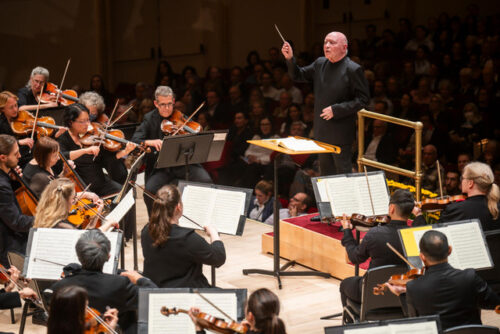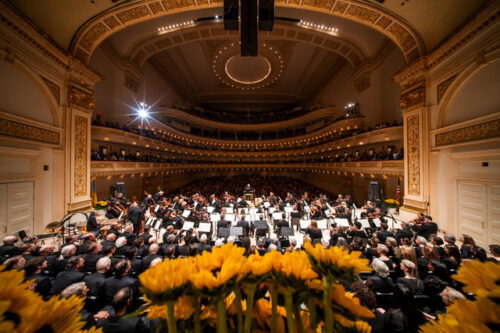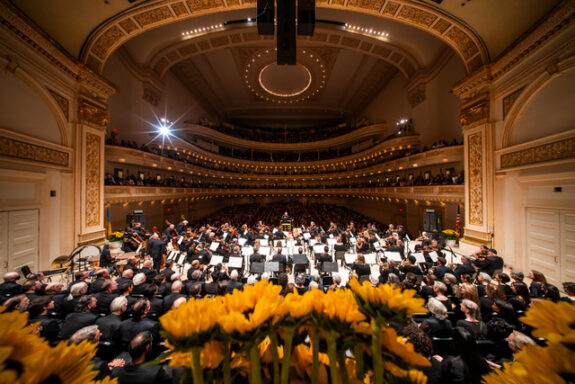 United States Various, Concert for the Children and Youth of Ukraine: Liev Schreiber (host), Olga Kulchynska (soprano), Emily D’Angelo (mezzo-soprano), Matthew Polenzani (tenor), Vladyslav Buialskyi (bass-baritone), Anne-Sophie Mutter (violin), Ukrainian Chorus Dumka of New York / Vasyl Hrechynsky (conductor), Oratorio Society of New York, Members of the Dessoff Choirs, Orchestra for Ukraine, Members of the Orchestra of St. Luke’s / Christoph Eschenbach (conductor). Carnegie Hall, New York, 23.10.2024. (RP)
United States Various, Concert for the Children and Youth of Ukraine: Liev Schreiber (host), Olga Kulchynska (soprano), Emily D’Angelo (mezzo-soprano), Matthew Polenzani (tenor), Vladyslav Buialskyi (bass-baritone), Anne-Sophie Mutter (violin), Ukrainian Chorus Dumka of New York / Vasyl Hrechynsky (conductor), Oratorio Society of New York, Members of the Dessoff Choirs, Orchestra for Ukraine, Members of the Orchestra of St. Luke’s / Christoph Eschenbach (conductor). Carnegie Hall, New York, 23.10.2024. (RP)

Mykhailo Verbytsky – National Anthem of Ukraine
Valentin Silvestrov – ‘Prayer for Ukraine’ (arr. Andreas Gies)
John Williams – ‘Across the Stars’ (Love Theme) from Star Wars Episode II – Attack of the Clones
Beethoven – Symphony No.9 in D minor, Op.125
Since the February 2022 Russian invasion of Ukraine, benefit concerts in New York to aid the country and its people have evolved into a ritual of sorts. Prominent figures in the music and theater world offer their services. Diplomats from Ukraine and the US respectively voice their gratitude or express continued commitment to the country in its fight for freedom.
According to custom, there was a video message from Ukrainian First Lady Olena Zelenska. Her bravery and resilience were evident to all and served as an inspiration to those gathered, as she made clear the dire situation that her country faces in its struggle for freedom. Especially at risk are the children.
Ritual has not evolved into routine, however, as evidenced by the Concert for the Children and Youth of Ukraine at Carnegie Hall. Few institutions can enlist the services of musical luminaries like conductor Christoph Eschenbach and violinist Anne-Sophie Mutter to perform at such an event. Fewer still have the visionary leadership of Robert F. Smith, Chairman of Carnegie Hall’s Board of Trustees, to spearhead and bring such an evening to fruition
Liev Schreiber, acclaimed for his performances on stage and screen, served as the host for the evening. His involvement goes beyond that of a star actor lending his name to a good cause. Schreiber is the co-founder of BlueCheck Ukraine, an organization that facilitates urgent financial support to the war-torn country. He also works with President Vladimir Zelensky as an ambassador for United24, an initiative to raise funds for Ukraine.
After the speeches, came the Ukrainian National Anthem (whose title translates to ‘Ukraine is Not Yet Dead’), sung by the Ukrainian Chorus Dumka of New York led by Vasyl Hrechynsky. Since the start of the war, when Chorus Dumka was thrust into the limelight, it has gained immeasurably in stature, both in terms of tone and presence. The chorus’s elegant and powerful singing of the anthem cast a reflective mood over the hall.
Now 84, Christoph Eschenbach brings a personal connection to the plight of Ukraine’s children – he was left an orphan at the end of World War II. The musicians whom he stood before were the Orchestra for Ukraine and members of the Orchestra of St. Luke’s. The Orchestra for Ukraine is comprised of young professional musicians assembled from around the world to represent their countries and express solidarity with Ukraine. The Orchestra of St. Luke’s, now in its fiftieth season, makes Carnegie Hall its home.
The first work they performed was Valentin Silvestrov’s ‘Prayer for Ukraine’. The hymn-like piece is a movement from a large work for a cappella chorus entitled Maidan 2014, which Silvestrov composed in honor of massive protests against Russian influence in Ukraine. Under Eschenbach’s baton, the orchestra achieved a remarkable sense of transparency in the work, which underscored the poignancy of the emotions conveyed in the music. Through sheer force of will, Eschenbach compelled silence from the audience at the end of the piece – a feat he would not be able to repeat as the concert progressed.
Resplendent in a yellow gown, one of the two colors of the Ukrainian flag, Anne-Sophie Mutter performed ‘Across the Stars’ from John Williams’s Star Wars Episode II – Attack of the Clones. Few living composers can craft melodies this beautiful, and Mutter played the emotion-infused lines with a silvery, ethereal sound that heightened their emotional impact. If the sentiments she generated were more bittersweet than romantic, the result was nonetheless spellbinding.
For an encore, she played another well-known Williams movie tune, the theme from Schindler’s List. Its association with Nazi atrocities is known to all. Stillness again reigned as Mutter played the moving melodies with simplicity and elegance and, if possible, perhaps with even more emotion than in the Love Theme.

The first half of the concert had been prayerful and reflective, but defiance, hope and triumph came after the intermission with Beethoven’s Ninth Symphony. Eschenbach led a taut, powerful reading of this monument to the human spirit. Under the circumstances, a muffed entrance or two and muddled textures were understandable, but they did nothing to diminish the urgency or intensity of the performance.
Carnegie Hall assembled a stellar international quartet of soloists for the Beethoven. Ukrainian Vladyslav Buialskyi’s forthright bass-baritone stilled the chaos with ‘O Freunde, nicht diese Töne’, and American tenor Matthew Polenzani sang with astounding vigor and zealousness. Just off a highly acclaimed run in Grounded at the Metropolitan Opera, Canadian Emily D’Angelo commanded attention with the fascinating timber of her mezzo-soprano voice. Olga Kulchynska, also Ukrainian, soared through Beethoven’s fiendishly difficult music for the soprano with ease and luminous tone.
Voices from two of New York’s finest choruses, Oratorio Society of New York and The Dessoff Choirs, sang with polish and displayed an acute appreciation of text. Particularly impressive were the robust tenor and bass voices, and a cadre of first sopranos who sang with impressive volume and passion when the music demanded just that.
Rick Perdian

Thank you, Rick Perdian, for your review of the powerful concert. It was a thrill to sing in the chorus for Beethoven’s Ninth Symphony.
Spectacular and emotionally moving evening in support of Ukraine’s children. Thank you, Rick, for your spot on review of this special concert, which gave me another chance to relive this beautiful event envisioning again Mutter’s golden gown and emotional playing under Eschenbach’s baton.